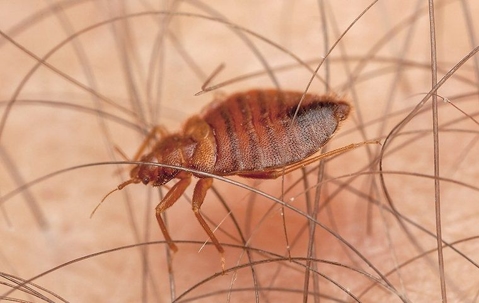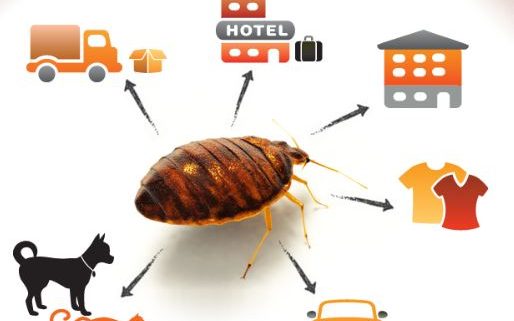Finest Kings Pest Control Cincinnati: Top-Rated Pest Control Experts
Finest Kings Pest Control Cincinnati: Top-Rated Pest Control Experts
Blog Article
Sorts Of Bug Control: Which Approach Is Right for Your Problem?
When faced with an insect infestation, the selection of an ideal approach for insect control is essential in properly handling the scenario. By exploring the numerous types of pest control techniques available, people can make informed choices tailored to their special circumstances, making certain an extra sustainable and efficient end result in insect eradication.
Chemical Bug Control
Chemical parasite control includes using synthetic or normally derived chemicals to handle and get rid of pest populations properly. This method is generally utilized in farming, forestry, and domestic setups to combat a large array of insects, consisting of insects, rats, and weeds. The usage of chemical pesticides can offer quick and targeted remedies to pest infestations, making it a prominent selection for many individuals and organizations.
One of the essential benefits of chemical parasite control is its capability to swiftly eliminate insects, reducing the threat of damages to plants, residential property, and human wellness. By making use of certain chemicals that target particular bugs, this approach can efficiently regulate invasions while lessening harm to helpful microorganisms and the atmosphere when used appropriately.
However, using chemical parasite control also increases problems about prospective negative results on non-target species, water sources, and human wellness. It is important to adhere to safety and security guidelines, use chemicals properly, and take into consideration alternative bug control techniques to lessen these risks and guarantee lasting insect administration methods.
Organic Parasite Control
Biological insect control, additionally called biocontrol, uses living organisms to take care of and lower pest populaces naturally. This method uses the power of nature to manage insects without the need for synthetic chemicals. Biocontrol can involve the intro of natural opponents of the pest types, such as predators, virus, or parasites, to suppress bug populations. By making use of the bug's natural killers or microorganisms, organic insect control supplies a eco friendly and lasting remedy to pest monitoring.

Mechanical Insect Control
Making use of physical and hand-operated approaches to take care of bug populations, mechanical bug control provides an alternate technique that does not depend on the use of living organisms or artificial chemicals. This technique includes making use of barriers, catches, or various other gadgets to physically discourage or get rid of insects. By obstructing insect entry factors or establishing traps to capture them, mechanical bug control can successfully decrease problems without introducing chemicals into the setting.
One common instance of mechanical insect control is making use of mesh screens on doors and windows to avoid pests from entering structures. This basic yet effective approach works as a physical barrier, maintaining insects out while enabling appropriate air flow. Furthermore, tools like mousetraps, fly swatters, and ultrasonic repellents fall under the mechanical parasite control category.
While mechanical parasite control methods can be labor-intensive and call for regular surveillance and maintenance, they use a eco pleasant and lasting service for managing insect problems. By integrating different mechanical methods, building owners can develop an extensive bug control strategy that lessens dependence on chemical pesticides.
Physical Insect Control

Some typical physical bug control approaches consist of the usage of barriers such as webs or displays to avoid insect access, catches to capture and get rid of bugs, and hand-picking to physically remove bugs from plants or structures. In addition, methods like heat therapies can be utilized to regulate bugs like bed bugs by elevating the temperature to degrees that are deadly to the insects.
Physical bug control is particularly valuable in incorporated parasite administration (IPM) approaches, where numerous insect control methods are integrated for efficient parasite administration while decreasing the use of chemicals. By making use of physical insect control strategies, individuals can effectively attend to pest invasions with marginal environmental effect.
Integrated Parasite Management
When applying physical pest control techniques as component of pest administration strategies, Integrated Insect Monitoring (IPM) becomes a thorough method that leverages numerous strategies to efficiently manage pest populaces. IPM focuses on long-lasting avoidance of pests with a combination of organic, cultural, physical, and chemical devices tailored to details bug issues. By integrating several control methods, IPM intends to minimize the dangers associated with bugs while additionally minimizing reliance on chemical options.
One secret facet of IPM is the focus on monitoring and examining pest populaces to establish one of the most suitable control techniques. This positive strategy enables very early intervention and targeted strategies, resulting in a lot more efficient insect monitoring. In addition, IPM promotes ecologically friendly methods by focusing on non-chemical control approaches and just using chemicals as a last resort.
Final Thought

By utilizing the parasite's natural predators or microorganisms, organic parasite control offers a environmentally friendly and sustainable remedy to pest management. - Kings best pest control cincinnati
Making use of manual and physical techniques to handle insect populaces, mechanical bug control uses an alternate technique that does not count on the usage of living organisms or synthetic chemicals.An effective method to handling insect populations without relying on chemical or organic approaches entails the usage of physical bug control methods.When applying physical parasite control techniques as part of insect administration techniques, Integrated Pest Management (IPM) emerges as a comprehensive method that leverages different techniques to effectively regulate pest populaces. Chemical bug control involves the usage of chemicals, organic parasite control utilizes all-natural killers, mechanical bug control includes physical obstacles, physical insect control includes capturing or getting rid of bugs, and integrated insect administration incorporates several techniques for an alternative method to pest control.
Report this page